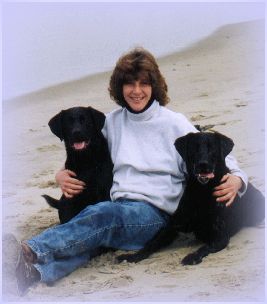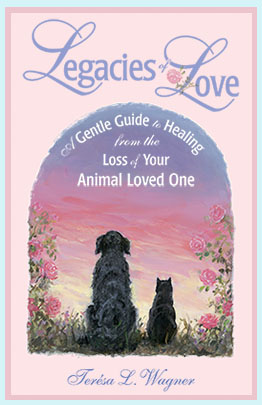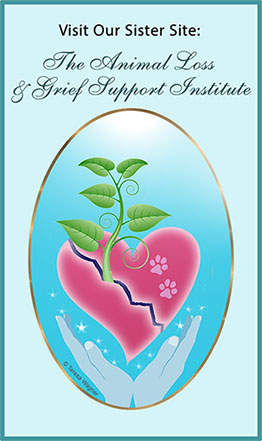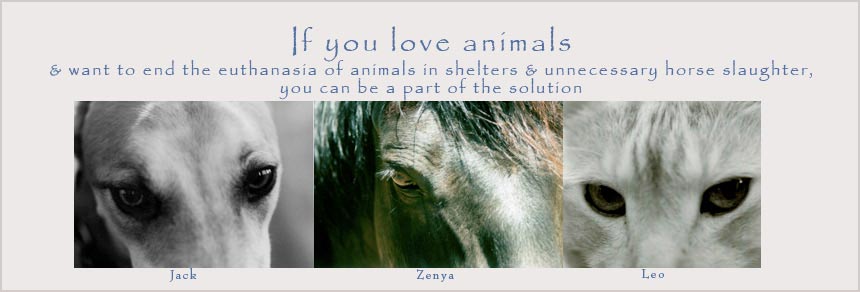Compassion Fatigue of Animal Care Work
Balancing Service and Self Care:
Healing Ideas for a Whole Life
-
Examine your motivation to help animals. Be willing to work on eliminating thoughts and beliefs which contribute to compassion fatigue and add those which prevent and heal it. See Exploring our Core Beliefs and Motivations to Help Animals
-
Remember to love yourself as much as you love the animals! Whatever your unique motivation to help animals, be sure it's balanced with loving yourself. If you don't take care of you, there will be little of quality left to give to the animals.
-
Honor yourself as one of the heroes who does some of the hardest and most important work done for animals in the world. Recognize and remember that in the complex, big picture of animal welfare issues you are part of the solution. You deserve and need to feel proud about what you are contributing.
-
Identify and work on healing your own painful life issues. Many of us are attracted to helping animals not only because we genuinely love them but because we also have been neglected, abandoned, or abused and it can be very fulfilling to help others who have been hurt like us. This is a commendable thing--but not if we avoid facing and healing our own pain. Sometimes we can even become addicted to helping in an unconscious quest to really heal ourselves. Don't be afraid to seek professional counseling, participate in a support group or other modes of healing. Sometimes we all need help processing overwhelming feelings or understanding and healing the hurts from our past, or need support to live with the horrors we sometimes see in this work. Seeking the help of a counselor when your heart is in pain is just as important as seeking the help of a doctor when your body is hurt.

-
Learn to protect yourself from others' emotional pain. We each have the capacity to feel and express deep compassion and empathy for animals and each other without taking on others' pain. We are less able to help when we take ownership of others' problems and pain because to do so takes so much energy. If you are a sensitive person and tend to feel the pain of others around you, you may want to consider listening the the MP3 recordings of Energetic Boundaries and Protection (though the were created for animal communicators and grief support practitioners, the principles and strategies are appropriate for anyone). Also consider reading the book The Highly Sensitive Person's Survival Guide which is listed in the resource section,
-
Accept your limitations - you can't save them all. No one person alone will change the overpopulation problem, find appropriate homes for every animal, or rescue every wild animal in distress. Yet together we can make a huge difference and change the world for the better, one animal at a time. When you feel overwhelmed or unable to do more, ask for help. Ask other people to help and, if it's in your belief system, pray.
-
Maintain a healthy and strong support system. Seek out people who share your values and nurture your growth. Cherish and enjoy your relationship with your own companion animals. Feel good about the love and home you provide for them.

-
Schedule time to simply relax and play! Cultivate interests, activities, and hobbies beyond your work. Shelter work is emotionally, physically, and spiritually taxing. Your deserve rejuvenation time - regularly!
-
Learn that strong emotions can be tolerated and need not be avoided. The work you do with and for animals is probably the most emotionally complex and exhausting work of any of the helping professions. Strong feelings of anger and rage, deep sorrow and anguish, and guilt are likely to be regular, returning experiences. Because of their strength and recurring nature, it's very, very important to learn ways to not merely temporarily cope and escape their intensity (though that's certainly healthy and necessary), but to learn to process these feelings and to release them. It's possible to live with these intense emotions without feeling overwhelmed or scared, or without stuffing and denying them. Feeling overwhelmed leads quickly to burnout, and denied feelings always come back later to haunt us. Find safe, comfortable, and appropriate ways to express your emotions:
- Talk about your feelings with someone who will listen and not judge you. Consider seeking the help of a counselor or therapist. (Be sure to look for a therapist who is trained in traumatic stress. Local Red Cross offices are good places to get referrals for this.)
- Write your feelings—in a journal, in unsent letters, in poetry, articles, or in carefully thought out letters to the person or group with whom you're angry.
- Draw your feelings—with paper and pen, with paints, with colored markers, etc.
- When you're really angry express your anger through a safe "temporary stopgap until it's released so you have the energy and calmness to explore it further.
- When feeling overwhelmed by sadness or grief, know this is a normal response to the work you do, and know you will not always feel it. Temporarily contain your overwhelming feelings in your "safe place" where you can take them out to process when you have the energy and the support you need to do so.
It's natural for any of us experiencing overwhelming emotions to seek relief. Some of us may stretch out in front of the TV, go shopping, sleep, work out or take a walk. Sometimes, too, it's easy for people with on-going, unchanging pressure to turn to alcohol or drugs for needed relief. Be very, very careful about your consumption of addictive substances, including prescription drugs. If you believe you are currently addicted to any substance, reach out for help now. You deserve a whole, full life in return for your work for the animals, not one riddled with the pain of addiction.
-
Learn and practice effective interpersonal skills to help you communicate with people at every level of your organization, the public, and with other agency personnel. Though it's true that most people are in this field because they love animals, we still all have varying personalities which can be cause for conflict, and our values and philosophies about how numerous animal issues should be handled will never be identical. Sharing love for the animals does not in and of itself make people working for them get along or work productively together. If we ex pect others to hear and care about our ideas and concerns, we all have a responsibility to build skills in empathic listening, influencing, negotiating, supervising, handling conflicts and customer service.
A great source for workshops on these topics is from organization consultant Jan Elster at www.shelterskills.com.

-
Treat yourself to sensory rejuvenation. In animal sheltering and resuce work, the senses of smell, sight, touch, and sound can be assaulted. Cleaning kennels doesn't smell so nice. Hearing dogs in rows and rows of kennels crying for attention you may not have time to give for as long as you'd like can be heartbreaking. Seeing animals who have been physcially neglected or harmed is very hard to see. By intentionally treating ourselves to sensory delights such as fragrances, music, petting our animals, or watching a sunset, we can help compensate our bodies and spirits for the regular onslaught of unpleasant sensory experiences. Find creative and meaningful ways to soothe your senses which make you feel alive, relaxed, and well.
-
Treat yourself to laughter! The heaviness of your work deserves to be balanced with humor and lightness. Watch those funny movies, laugh at your companion animals' antics, enjoy jokes with your colleagues. Enjoy your sense of humor...
-
Embrace your spirituality. Take time out from the stress of this work to connect with your spirit everyday. Clarify what it is that makes you feel in touch with your true spirit and do these things regularly. Whether it's prayer, meditation, being with your own companion animal, viewing wildlife, hugging your significant other, smelling roses, walking at the o cean, spiritual reading_you need and deserve to feel centered and whole. Find comfort, strength, and meaning in your own spiritual beliefs and practices.
Psychological approaches to stress management tend to be the ones that help us cope. Though coping is a necessary competency for daily living, to truly heal stress, to truly comes to terms with the deep pain of compassion fatigue, we need to be at peace in our own souls.
COPYRIGHT AND AUTHORSHIP NOTICE: The information contained in this Compassion Fatigue section of my site was originally written in 1994, has been updated several times and has been copyrighted since its inception. In July 2015, Judy Scheffel used the material on these pages as if it was her own, violating copyright law and a written agreement to use it only with attribution, for a webinar organized by Lisa Levinson and sponsored by In Defense of Animals. A video of the webinar, in which Scheffel plagiarized thousands of words from this site and deceptively presented the models in these pages as if they were her own original concepts, appeared on the In Defense of Animals web site and on YouTube until August 20, 2016.
If you participated in this webinar or viewed it on YouTube, please be advised that authorship of approximately 80% of the webinar content includes material copyrighted by Teresa Wagner and was used fraudulently by Judy Scheffel.







